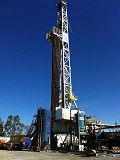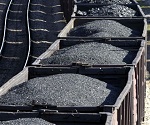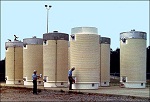Court upholds EPA greenhouse gas regulations
 In a strongly worded unanimous decision, a federal appeals court recently upheld the Environmental Protection Agency's authority to regulate greenhouse gas emissions, as well as the EPA's "endangerment finding" that holds that those gases present a threat to human health and welfare. The court also upheld the EPA's authority to "tailor" such regulations as it sees fit, which will allow the EPA to exempt small sources of emissions and focus its regulations on large emitters (which would be more practical, and a less expensive way of reducing emissions). The court stated that the EPA's interpretation of the Clean Air Act (CAA) requirements was "unambiguously correct" and that its proposed rules were neither capricious nor arbitrary.
In a strongly worded unanimous decision, a federal appeals court recently upheld the Environmental Protection Agency's authority to regulate greenhouse gas emissions, as well as the EPA's "endangerment finding" that holds that those gases present a threat to human health and welfare. The court also upheld the EPA's authority to "tailor" such regulations as it sees fit, which will allow the EPA to exempt small sources of emissions and focus its regulations on large emitters (which would be more practical, and a less expensive way of reducing emissions). The court stated that the EPA's interpretation of the Clean Air Act (CAA) requirements was "unambiguously correct" and that its proposed rules were neither capricious nor arbitrary.
Lawsuits had been filed by organizations including the U.S. Chamber of Commerce, the National Mining Association, and the National Association of Manufacturers, as well as the states of Texas and Virginia. The plaintiffs had argued that the proposed regulations would be "devastating," and would result in substantial economic costs and job losses, which would be especially harmful in times of economic weakness and high unemployment. In response to the ruling, the plaintiffs have stated that all legal avenues are being considered, and that there is a good chance that they will appeal.
One of the first specific EPA greenhouse gas regulations is a proposed rule that concerns new power plants. The rule would require any new plant to have CO2 emissions equal to or less than that of a modern natural gas-fired plant. Thus, any new coal plants would have to rely on some form/degree of carbon sequestration in order to comply. Since large-scale, economic, commercially available sequestration technology does not yet exist, this is generally viewed as being a de-facto ban on new coal plant construction.
Political responses/ramifications
Legal
Although the current Supreme Court is generally considered "conservative," it may be unlikely that any appeal of the appeals court ruling would be successful. After all, in 2007 the Supreme Court ruled that the EPA violated the CAA by NOT taking any action to address global warming emissions.
 Essentially, the CAA simply requires that hazardous air pollution be adequately addressed, and it leaves the details (and specific cases) up to the EPA (and to science). Thus, unless the CAA is amended, it comes down to science, and the scientific case was (apparently) already successfully made to the Supreme Court. Thus, unless there is some major new scientific evidence to present (showing that global warming is not an issue), it is unlikely that the court will reverse itself, especially given that the EPA is now on the other side of the issue.
Essentially, the CAA simply requires that hazardous air pollution be adequately addressed, and it leaves the details (and specific cases) up to the EPA (and to science). Thus, unless the CAA is amended, it comes down to science, and the scientific case was (apparently) already successfully made to the Supreme Court. Thus, unless there is some major new scientific evidence to present (showing that global warming is not an issue), it is unlikely that the court will reverse itself, especially given that the EPA is now on the other side of the issue.
Legislative
In the legislative arena, Republicans have vowed to pass legislation that would specifically remove EPA's authority to regulate greenhouse gas emissions. Mitt Romney has stated that he would support such legislation, as well as efforts to roll back other EPA requirements on other fossil plant pollutants.
While this legislative approach would pass constitutional muster, the effort is unlikely to succeed, given the current Democratic control of both the senate and the presidency. It's doubtful such a law could pass even if Romney wins in November and the Republicans gain a majority in the senate. In present day Washington, 60 senate votes are necessary to pass any significant or controversial piece of legislation, and it is very unlikely that the Republicans (or those opposed to action on global warming) would ever get such a large senate majority.
Administrative
The final avenue for opposing EPA greenhouse gas rules is in the administrative arena (if Romney becomes president). Here, the situation is a little less clear.
 The EPA is part of the administrative branch, and answers to the president. A new EPA head would be appointed by Romney, and would likely share his views on greenhouse gas regulations. Would a Romney EPA simply halt the development of any proposed rules? If the rules are formally established before he takes office, would his EPA actually rescind the rules? Could they simply choose not to enforce them?
The EPA is part of the administrative branch, and answers to the president. A new EPA head would be appointed by Romney, and would likely share his views on greenhouse gas regulations. Would a Romney EPA simply halt the development of any proposed rules? If the rules are formally established before he takes office, would his EPA actually rescind the rules? Could they simply choose not to enforce them?
I couldn't find any references to Romney having plans to defeat greenhouse gas regulations administratively; only references to his support of legislative efforts. Perhaps the reason for this is the 2007 Supreme Court ruling. In that case, the Bush EPA was dragging its feet in terms of regulating greenhouse gases, and the court basically said that they had to do something. Thus, if a Romney EPA tries to rescind or not enforce greenhouse gas regulations, the agency will be sued, and it is likely that the courts will require the EPA to take action, given that the CAA has not been amended.
Economic cost of emissions controls
I don't find opponents' arguments about greenhouse gas regulations having a "devastating" economic impact at all compelling, especially given the current low cost of natural gas. These are largely the same people who are crowing the loudest about the "miracle" of low cost (shale) gas, and how much it will benefit the economy. But they then try to ignore the low gas cost when they make grim predictions about the effect of coal plant closures on electricity prices and the overall economy. They can't have it both ways.
 Currently, gas prices are so low that many utilities are voluntarily shutting down coal plants and firing up (or even building) gas generation to take its place. Note that they are making this decision despite the fact that there is absolutely no economic incentive being given to choose gas over coal (i.e., to reflect coal's higher CO2 emissions and the enormous environmental/health impacts of its other pollutants).
Currently, gas prices are so low that many utilities are voluntarily shutting down coal plants and firing up (or even building) gas generation to take its place. Note that they are making this decision despite the fact that there is absolutely no economic incentive being given to choose gas over coal (i.e., to reflect coal's higher CO2 emissions and the enormous environmental/health impacts of its other pollutants).
For the first time ever, gas recently accounted for the same fraction of U.S. power generation (32 percent) as coal did. A dramatic example is Southern Company, a large, historically coal-dependent power utility. As recently as five years ago, Southern got 70 percent of its power from coal and only 16 percent from natural gas. Now they're getting only 35 percent from coal and 47 percent from gas.
In general, utilities are planning on shutting many of their existing coal plants in a few years, rather than installing expensive retrofits that will be required by EPA rules already on the books. Instead, that generation will be replaced by gas (and a few new nuclear plants).
Again, these decisions were made in the absence of any economic disincentive (e.g., tax) for CO2 emissions or any other pollutants. Thus, we're seeing a substantial reduction in CO2 emissions without any economic cost. As many experts have pointed out, EPA's (de-facto) no-new-coal-plant rule is entirely moot, since no coal plants are (or will be) built anyway. As we're seeing, even existing coal plants are finding it hard to compete with gas. Paying a high capital cost to build new coal plants is a non-starter (especially given that most utilities still expect some kind of CO2 limits or penalties, eventually).
The need for emissions reduction policies
Given how close gas and coal generation are right now in terms of operating cost, it seems clear that even a small economic disincentive to use coal would go a very long way, and result in a much larger reduction in coal use.
 My belief is that given the low cost of natural gas, we've lost every last excuse for keeping very old, grossly-polluting coal plants open. There are no longer any valid economic arguments, given that the incremental cost of replacing those plants with gas generation would be minimal. I find the notion of using coal instead of gas (or nuclear, or renewables) just because the operating cost is slightly lower to be very disturbing. This shows why we must have policies that place at least some economic weight on health and environmental impacts. In an earlier post, I discussed the possibility of using the dispatch queue to give preference to cleaner generation.
My belief is that given the low cost of natural gas, we've lost every last excuse for keeping very old, grossly-polluting coal plants open. There are no longer any valid economic arguments, given that the incremental cost of replacing those plants with gas generation would be minimal. I find the notion of using coal instead of gas (or nuclear, or renewables) just because the operating cost is slightly lower to be very disturbing. This shows why we must have policies that place at least some economic weight on health and environmental impacts. In an earlier post, I discussed the possibility of using the dispatch queue to give preference to cleaner generation.
Most experts agree that natural gas prices will go back up at some point, after the economy recovers. Will coal plants closed today remain closed in the future? In our (nuclear) industry they certainly do. On the other hand, many utility executives have said that they will go right back to coal (i.e., reopen old coal plants) once gas prices increase. Strict pollution regulations, or even a small price on CO2 emissions, would go a long way toward preventing coal plant restarts, and would significantly raise the gas price threshold at which such restarts would be considered.
The EPA's proposed power plant rule would effectively rule out new coal plants. Stricter pollution controls, policies that tax or limit CO2 emissions, or the proposed Clean Energy Standard would all act to speed the retirement of old, heavily-polluting coal plants. Such policies that place a small economic penalty on CO2 emissions and/or other air pollutants will lead to significant reductions in emissions at a very modest cost to the overall economy.
Impact on nuclear
 The above policies would increase gas demand in the short term, which will eventually result in higher gas costs. This will make nuclear more competitive. Without these rules/policies, nuclear's future looks rather doubtful, frankly, as it will probably remain more expensive than coal, and continued coal use would act to keep gas prices low.
The above policies would increase gas demand in the short term, which will eventually result in higher gas costs. This will make nuclear more competitive. Without these rules/policies, nuclear's future looks rather doubtful, frankly, as it will probably remain more expensive than coal, and continued coal use would act to keep gas prices low.
The basic fact is that if nuclear is required to completely contain all of its wastes/toxins, for as long as they remain hazardous, and competing sources are allowed to freely dump their toxins into the environment, at no cost, it's hard to see how nuclear will ever have a chance. It's a matter of fairness, if nothing else.
_____________________________

- Hopf

